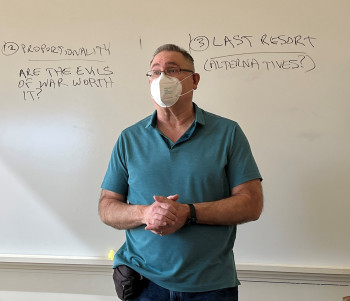Tough sanctions imposed by Western countries, coupled with President Biden’s restraint regarding Russian President Vladimir Putin’s threat to use nuclear weapons, are the right response to Russia’s unprovoked invasion of Ukraine, say international-relations experts with DePauw connections.
Still, “it’s a very dangerous time, I believe, in the history of the world, and we have to be alert to that fact,” said former U.S. Rep. Lee Hamilton ’52, who represented southeastern Indiana in Congress for 34 years and gained a global reputation as an expert in foreign affairs. “You cannot let this spin out of control and turn into World War III. So I think we have to ask ourselves what our national policy really is here and defend, obviously, that national interest, but avoid World War III.”
The West’s approach has been “so far, so good,” said Hamilton, who was chairman of several House committees, including Foreign Affairs and Intelligence. Biden “obviously is restrained … and yet firm at the same time. It’s just a mixture of firmness and restraint that is required.”
Deepa Prakash, the Frank L. Hall professor of political science and an expert on international relations, likewise thinks the West has taken the correct approach, including Biden’s decision to de-escalate when Putin threatened to use nuclear weapons.

Biden and other Western leaders “have been very skilled to simultaneously put pressure but also give Putin room to back off, because what you don’t want is to put so much pressure, to make things so overwhelmingly difficult, that he’s got, quote-unquote, ‘no choice’ but to continue to escalate,” Prakash said. “… What is scary to me is he’s making all these wild, very aggressive postures, but does he or will he feel like he’s got the room to back off?”
Those who suggest the United States has not been tough enough are not considering that “you want to give him enough room to de-escalate and save face … because if you keep escalating, there’s no place to go but up,” she said. “And you don’t want that.”
In interviews this week, both analysts said that, given the lack of any clear-cut, early victory by Russian forces, it appears that Putin overestimated his military’s ability to swiftly overrun Ukraine and underestimated the world’s revulsion at the unprovoked invasion.
“He underestimates the power and the unity and the will of the West and of NATO specifically,” Hamilton said. “NATO is arguably the most successful alliance in the history of alliances, and is proving to be much more forward and formidable to deal with than I think he anticipated.”
Putin has cited various reasons for his aggression toward Ukraine but none that justify the invasion, let alone the threat to use nuclear weapons, Prakash said.
 In a presentation today about the “just war theory,” Jeremy Anderson, assistant philosophy professor, asked attendees to determine whether Russia’s aggression constitutes a “just war” by listing the reasons Putin has cited. Among them were to prevent Ukraine from joining NATO; to overthrow an illegitimate and pro-Western Ukrainian government; to restore Ukraine as a territory of Russia; and to stop the genocide of Russians living in Ukraine supposedly being perpetrated by the Ukraine government.
In a presentation today about the “just war theory,” Jeremy Anderson, assistant philosophy professor, asked attendees to determine whether Russia’s aggression constitutes a “just war” by listing the reasons Putin has cited. Among them were to prevent Ukraine from joining NATO; to overthrow an illegitimate and pro-Western Ukrainian government; to restore Ukraine as a territory of Russia; and to stop the genocide of Russians living in Ukraine supposedly being perpetrated by the Ukraine government.
Even if all were true – and they are not, Anderson said – “I just don’t think that that comes close to justify the action that they are taking.”
Hamilton said that Putin’s motivation comes down to this: “Fundamentally he opposes the West and sees the West as wanting a very different kind of world than he contemplates, and so he wants to promote Russia and diminish the power and prestige in the West, particularly the United States.”
Browse other stories
-
Athletics
-
Softball - Tigers' Season Comes to an End in NCAA Softball Regional
-
Softball - Tigers Stay Alive in NCAA Tourney with Two Wins
-
Softball - DePauw Falls to Cardinals on Opening Day of NCAA Regional
More Athletics
-
-
News
-
DePauw celebrates class of 2024 at 185th Commencement
-
Terre Haute South teacher receives Battey National Educator Award
-
Newest recipients of Walker Cup, Murad Medal announced
More News
-
-
People & Profiles
-
11 alums make list of influential Hoosiers
-
DePauw welcomes Dr. Manal Shalaby as Fulbright Scholar-in-Residence
-
DePauw Names New Vice President for Communications and Strategy and Chief of Staff
More People & Profiles
-
-
Have a story idea?
Whether we are writing about the intellectual challenge of our classrooms, a campus life that builds leadership, incredible faculty achievements or the seemingly endless stories of alumni success, we think DePauw has some fun stories to tell.
-
Communications & Marketing
101 E. Seminary St.
Greencastle, IN, 46135-0037
communicate@depauw.eduNews and Media
-
News media: For help with a story, contact:
Bob Weaver, Senior Director of Communications.
bobweaver@depauw.edu .




